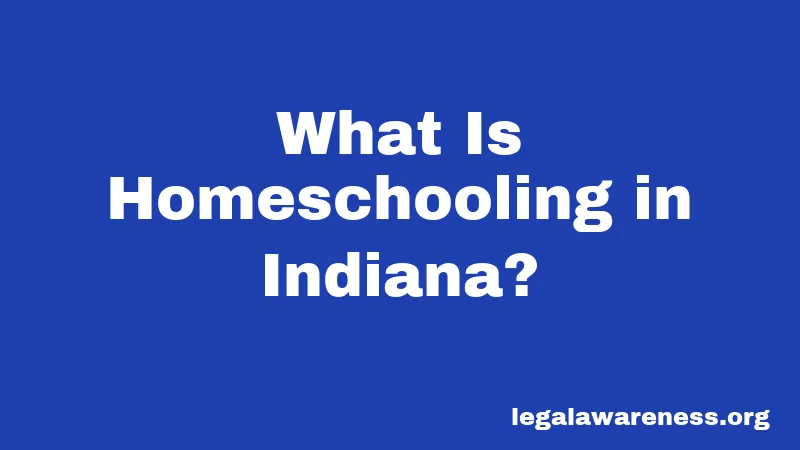Indiana Homeschool Laws in 2026: Your Complete Legal Guide
Think homeschooling in Indiana sounds complicated? Actually, it’s one of the most relaxed states when it comes to homeschool regulations. Seriously. Most parents are shocked by how much freedom they have here. But freedom also means knowing what you need to do to stay on the right side of the law.
Here’s what you need to know. Indiana has some basic requirements, but nothing too demanding. Let’s break it down so you know exactly what’s required and what’s not.
What Is Homeschooling in Indiana?

Homeschooling in Indiana means you’re educating your child at home instead of enrolling them in a traditional public or private school. The state officially recognizes homeschools as non-accredited private schools. This matters because it gives you a lot of control over what your child learns and how they learn it.
You have the freedom to choose your own curriculum. Pretty straightforward, right? Indiana doesn’t mandate specific textbooks or educational approaches. Your child can learn through online programs, workbooks, real-world projects, or a mix of everything. That flexibility is one of the big reasons families choose homeschooling here.
Basic Requirements You Actually Need to Know
Age Requirements and Compulsory Education
Here’s the key age rule: children must be between 7 and 18 years old to fall under Indiana’s compulsory education law. This means you can start homeschooling legally at age 7. Before that age, there are no school attendance requirements.
Once your child turns 7, they’re required to receive instruction. Homeschooling counts as legal instruction. If you start homeschooling before age 7, that’s fine—Indiana doesn’t prohibit it. But it’s not legally required.
Not sure if this applies to your family? Most families with school-age kids are covered by this rule.
Instruction Hours and Days
You must provide 180 days of instruction in each academic year. The academic year runs from July 1 through June 30. This sounds like a lot, but you get some flexibility here. If your child attended public school part of the year, those days count toward your 180-day requirement.
Days don’t have to be consecutive either. You can take breaks whenever your family needs them. Many families school year-round or take extended breaks during summer and holidays. As long as you hit 180 days within that July-to-June window, you’re good.
What about the instruction hours themselves? Indiana doesn’t specify a certain number of hours per day. You decide what schedule works for your family.
Record Keeping: The Simple Part
Here’s where it gets easy. Indiana law requires that you maintain attendance records. But there’s no specific form you need to use. You don’t have to report to anyone. You’re just keeping these records for yourself.
Keep it simple. You could use a calendar, a spreadsheet, or a notebook. Just document the days your child received instruction. If questions ever come up, these records protect you. They show you’re meeting the 180-day requirement.
No grades required. No curriculum records required. No testing mandates. Indiana really doesn’t ask for much here. Honestly, this is one of the most appealing parts of homeschooling in this state.
Do You Have to Register Your Homeschool?

Wait, here’s important news. Registration is completely optional in Indiana. Completely. You don’t have to tell anyone your child is being homeschooled. No state registration. No local school district notification. Nothing.
But here’s the thing: if you do choose to register, you can. The Indiana Department of Education accepts voluntary homeschool enrollment forms. Some families register to have an official record on file. Others skip it entirely because they don’t need to.
If you register, you only do it once. That registration remains active year after year. An email verification will be automatically generated and sent to you.
Not required? So why register at all? Some families like having official documentation. It can be helpful if questions arise later. But it’s entirely your choice.
Withdrawing from Public School to Homeschool
If your child currently attends public school, you’ll need to withdraw them. For elementary and middle school students, the process is straightforward. You simply notify the school that you’re withdrawing. Parents don’t need to sign any special forms or get approval.
High school students have an extra step. When withdrawing a high school student, you must submit a “Withdrawal to Non-Accredited Non-Public School Located in Indiana” form. This allows the high school to remove your student from the graduation cohort. If you don’t submit this form, your student may be marked as a dropout instead of being properly withdrawn to homeschool.
The form exists to distinguish between homeschoolers and dropouts. It’s not a registration form. It’s just administrative. The school needs to know your child isn’t dropping out—they’re transitioning to homeschooling.
Here’s where it gets real: if you don’t submit the form, your school can report your student to the Bureau of Motor Vehicles. This could affect your teen’s ability to get or renew a driver’s license. So for high school students, definitely get that paperwork in.
Recent Changes: What’s New in 2025-2026

Stay with me here. Some important things just changed. In early 2025, Indiana passed HEA 1348. This new law might actually help homeschoolers. Here’s why it matters.
The law officially recognizes homeschool diplomas as meeting Indiana’s high school completion requirements. Schools and colleges can’t reject students solely because they were homeschooled. This protects homeschool graduates from discrimination.
Why does this matter? One example from a major law enforcement agency showed a problem. They had turned down an applicant who was homeschooled, even though the applicant had a college degree from Ball State University. The law now prevents this type of discrimination.
Your homeschool diploma is legally valid now. No extra testing required. No additional hoops to jump through. Pretty significant shift.
There’s also SB 483 floating around the legislature. This bill would add new requirements for students who withdraw from public school specifically due to chronic absenteeism. It’s not law yet, but it’s important to watch. The bill would require a “thorough plan” and meetings with the superintendent. Many homeschool advocates are concerned about these extra regulations. Right now, it hasn’t passed, but stay informed about pending legislation.
Curriculum and Subject Requirements
Here’s the freedom part: Indiana doesn’t mandate specific subjects. You won’t find a checklist of required courses. The state doesn’t require math, science, language arts, history—not officially, anyway.
But wait. If your child eventually applies to college or takes standardized tests, they’ll need a solid education covering core subjects. Most homeschoolers cover the basics: math, language arts, science, and social studies. Many parents follow public school standards just to ensure their children are prepared for the future.
The choice is yours, though. Want to focus on your child’s interests? Go for it. Want to follow a traditional curriculum? That works too. Indiana gives you complete control over educational content.
Testing Requirements
Good news. Indiana doesn’t require homeschool students to take standardized tests. None. Zero. You won’t be mandated to give your child the IREAD-3 reading test or any other state assessment.
That said, many families choose to use testing anyway. Why? It provides an objective measure of academic progress. It helps with college applications. It gives you peace of mind. But it’s entirely optional.
If you’re planning to apply to college, your child might want to take the SAT or ACT. These are the standard college entrance exams. They’re not required by the state, but colleges want to see them. That’s a different story from state testing mandates.
Special Education and Accommodations
You can absolutely homeschool a child with special needs in Indiana. The law doesn’t prevent it. Your child might have a physical disability, a learning disability, or any other special need. Homeschooling could be an excellent fit for your family.
Here’s what’s important: you’re not required to follow an Individualized Education Plan (IEP) if you homeschool. You won’t have access to some special education services that public schools provide, but you have complete freedom to adapt instruction to your child’s learning style.
Talk to your local school district if you want information about special needs resources. Some families use a combination approach. They might homeschool but also access certain services or programs available through the district. Check what’s available in your area.
High School, Diplomas, and Transcripts
Alright, your homeschooled high schooler needs a diploma. Indiana doesn’t issue official homeschool diplomas. You create one yourself. You’re in charge.
Here’s what you should do: develop a course of study following Indiana’s public school core requirements. Keep a detailed transcript showing all courses and grades. When your student graduates, you issue the diploma.
A parent-issued diploma is perfectly acceptable in Indiana. It’s legally valid. But make that transcript impressive. Include course names, grades, any extracurricular activities, and the date of graduation.
Many homeschoolers create transcripts using templates available online or through curriculum providers. Some use platforms like Time4Learning that generate transcripts automatically. Whatever method you choose, keep it organized and thorough.
College admissions officers understand homeschool transcripts. They’re used to seeing them. What matters is showing your student has completed rigorous coursework. Include a copy of your student’s SAT or ACT scores. Add reference letters from tutors, mentors, or community leaders. Build a complete application package.
Penalties for Non-Compliance
What happens if you’re not following the rules? Let’s be honest. The most serious consequence is an educational neglect charge. This would only happen if there’s clear evidence your child isn’t receiving instruction at all.
If you maintain attendance records and provide reasonable educational instruction, you shouldn’t have problems. Indiana’s main enforcement mechanism is the compulsory education law for ages 7-18. The state could compel school attendance if a child isn’t receiving instruction anywhere.
Real penalties are rare when families are genuinely homeschooling. Courts and school officials know the difference between neglect and non-traditional education.
Here’s the protection: keep those attendance records. Document that 180 days of instruction is happening. If questions ever arise, your records prove you’re complying with the law.
Can Homeschoolers Participate in School Sports?
This is a question many families ask. Indiana law doesn’t prohibit it. Some homeschoolers participate in school sports through their local district. Some join private athletic leagues. Some focus on club sports instead.
Rules vary by school and district. Some schools allow homeschoolers to participate. Others don’t. Contact your local high school athletic director to ask about eligibility. Rules are often more flexible for homeschoolers than for traditional private school students.
Many homeschoolers find athletic opportunities through community organizations, churches, and private leagues. These can be just as competitive and fulfilling as school sports.
Getting Started: Step-by-Step
Ready to start homeschooling? Here’s what to do. First, if your child is currently in public school, withdraw them formally. For high school students, submit that withdrawal form to avoid dropout marks on their record.
Second, decide your educational approach. Will you use a structured curriculum? Will you homeschool through a co-op? Will you create your own learning plan? Explore options. Many resources are available to help.
Third, maintain attendance records from day one. It’s the easiest legal requirement to meet if you’re tracking it from the start.
Fourth, connect with other homeschooling families. Join a local homeschool group. These communities offer support, resources, field trips, and co-op opportunities. You don’t have to homeschool alone.
Fifth, stay informed about changes to Indiana law. Laws can change. New bills are proposed regularly. Join an advocacy group like the Indiana Association of Home Educators (IAHE) to stay updated.
Frequently Asked Questions
Do I need a degree to homeschool my child in Indiana? No. Indiana has no educational requirements for parents who homeschool. You don’t need a teaching certificate or college degree. You’re responsible for your child’s education, and that’s what matters.
Can my child get a driver’s license while being homeschooled? Yes, absolutely. Homeschooling status doesn’t affect driver’s license eligibility. The only issue arises if you don’t submit the high school withdrawal form—that could trigger a dropout report to the DMV.
What if my child wants to return to public school after homeschooling? Most schools will accept your child back. You may need to provide transcripts or records showing the work completed. Younger children usually transfer with no issues. For older students, high schools might require transcript evaluation.
Are homeschoolers required to take college entrance exams? No, the state doesn’t require it. But most colleges want to see SAT or ACT scores. If your child is college-bound, these exams are practically necessary even though they’re not state-mandated.
Can I homeschool multiple children using the same curriculum? Yes. Many families do this. You can use one curriculum for multiple children or different curricula for each child. Indiana doesn’t regulate this choice at all.
Resources and Support
The Indiana Department of Education website has helpful information about homeschooling. Visit their homeschool page for official guidance and the voluntary registration form.
The Indiana Association of Home Educators (IAHE) is an excellent resource. They provide advocacy, community, and updates about legal changes. Joining a group like this keeps you informed and connected.
Time4Learning and similar online curriculum providers offer structured programs designed for homeschoolers. They’re popular in Indiana because they’re flexible and comprehensive.
Your local homeschool co-ops offer classes, field trips, and community. A quick internet search will show what’s available in your area.
Final Thoughts
Homeschooling in Indiana is legal, straightforward, and flexible. You have incredible freedom to customize your child’s education. The state asks for minimal documentation and very few specific requirements.
The key is understanding what Indiana actually requires: 180 days of instruction, age-appropriate students (7-18), and attendance records. Everything else—curriculum, teaching methods, testing—is your choice.
Take time to learn the requirements. Connect with other homeschooling families. Stay informed about potential law changes. And most importantly, keep those attendance records updated.
You’ve got this. Thousands of families successfully homeschool in Indiana every year. With a basic understanding of the law and good record-keeping, you’ll be just fine. Welcome to the Indiana homeschooling community.
